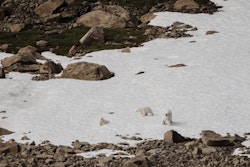Polar bears threatened by climate change
Energy Observer is becoming the first vessel in the world to join the Arctic Circle, only powered by renewable energy and hydrogen. 2,400 miles to sail from St Petersburg to Spitsbergen, an iconic destination for many reasons.
This island in the Norwegian archipelago of Svalbard is deeply impacted by the climate change more than anywhere else on the planet. A phenomena that Energy Observer will report on during its Odyssey.
“3,000 polar bears. 2,500 men. You are not the kings. ” This is the warning to tourists when they get off the plane in Longyearbyen, the capital of Svalbard. Here, the authorities are not kidding about safety or wildlife protection. For a long time, poaching has put polar bears at risk. This is still the case in some parts of the Arctic, where it is estimated that 5% of the population is hunted each year. But in Spitsbergen today, only a few recklessness still leads to tragedies. So the sad story of this polar bear killed by a guard a year ago.
Threatened by climate change
Nowadays, it is mainly global warming, which is much faster in the region than in the rest of the world, that threatens the survival of polar bears. Because these animals, incredibly well adapted to the original harshness of their environment, are used to hunting on the ice floe. And the ice pack, unfortunately, is melting today at an alarming rate. Reducing the hunting season for polar bears like a skin of sorrow. His health is declining. It grows less and loses weight significantly. Litters are rarer and less numerous. Fewer cubs are able to survive.

Polar Bears threatened by climate change
Deprived of this space for hunting and natural life, the polar bear – classified as “vulnerable” by the International Union for Conservation of Nature (IUCN) – is trying to adapt. It now attacks birds and their eggs. He saves energy by sleeping as much as possible during the summer. And above all, he ventures more and more on land, towards the areas inhabited by man. In this way, it faces conflicts whose outcome, despite its size and power, is generally unfavourable.
Our Spitsbergen series
[Spitsbergen Objective] Ground zero of climate change
[Spitsbergen Objective] What are the consequences of melting ice?
[Spitsbergen Objective] In Svalbard, memory of 13,000 years of biodiversity
[Spitsbergen Objective] Longyearbyen, the fastest warming city on Earth
To go further
Polar bears really are starving because of global warming, study shows – National Geographic
L’ours polaire, le seigneur de la banquise victime du réchauffement climatique – WWF
Réchauffement climatique : Un tiers d’ours polaires en moins d’ici 2050– 20 minutes
Stricken polar bears turns up in Siberian city, hundreds of miles from home – The Guardian